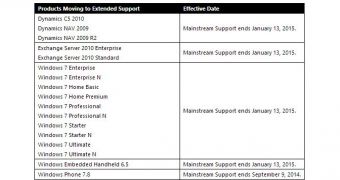The Windows XP upgrade nightmare isn’t yet over, but Microsoft seems to be ready to start a completely new one, as the company today issued some end of support warnings for a number of products, including Windows 7, Office 2010 Service Pack 1, Windows Server 2003, and Windows Server 2008.
Redmond today rolled out a new advisory to warn that support for several software products across its range is coming to an end, which basically means that those running it should upgrade to a newer release as soon as possible.
There’s no doubt that Windows 7 is the number one entry on the list, with Microsoft warning that support for Enterprise, Enterprise N, Home Basic, Home Premium, Professional, Professional N, Starter, Start N, Ultimate, and Ultimate N packages is ending on January 13, 2015.
While these Windows 7 versions are exiting mainstream support, they will still get extended support for an additional 5 years, but Microsoft says that it’s anyway recommended to upgrade as soon as possible just to make sure that you’re completely secure.
As ZDNet’s Mary Jo Foley writes, Windows Server 2003 is also about to reach complete end of support next year, so Microsoft obviously warns that it might take more than expected to finalize the transition to a newer release, no matter which one you choose.
"With the average Windows Server taking over 200 days to migrate, now it is the time to act and start planning for your migration," the company said in a statement, trying to emphasize that it’s better to create a plan to complete the upgrade to a supported OS version in time. "With the Architectural changes in 32 bit to 64 bit technology – everything changes in Windows Server 2012."
As you can see, Microsoft seems to be ready to start a new and very long upgrading process of its software, even though the company still struggles to convince those on Windows XP to switch to either Windows 7 or Windows 8.1.
At the same time, it’s also working on some pretty critical updates for the Windows platform, including a brand new Windows version that could hit the market in early 2015 as Windows 9.
Of course, Windows 9 is considered to play a key role in Microsoft’s strategy to move users to newer platforms, so it remains to be seen how many users would actually give up on their current Windows installation to switch to Windows 9 when it hits the market.

 14 DAY TRIAL //
14 DAY TRIAL //